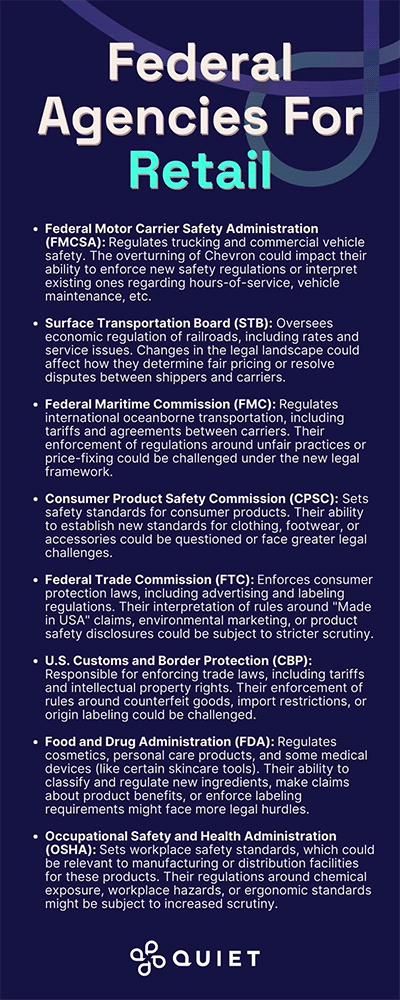
The U.S. Supreme Court’s recent decision to overturn the Chevron Doctrine is poised to have far-reaching effects across various industries, including retail. For apparel and footwear companies, gifts and accessories sellers, and health and beauty retailers, this legal shift could mean changes in how government agencies regulate your business. Let’s break down what this ruling means and explore potential implications for your sector.
Understanding the Chevron Doctrine
In simple terms, the Chevron Doctrine was a legal principle that gave federal agencies significant leeway in interpreting and enforcing ambiguous laws. When Congress was not specific—they could impose their own interpretation.
It let them operate in the gray, forging forward with their missions and enforcing rules in the way they deemed best. If Congress hadn’t explicitly addressed a specific issue, agencies like the Environmental Protection Agency (EPA), the Food and Drug Administration (FDA), or the Operational Safety and Health Administration (OSHA) had the authority to fill in the gaps with their own interpretations.
Think of it like this: imagine Congress writes a law saying that products must be “safe.” The Chevron Doctrine allowed agencies to decide what “safe” actually meant in practice, setting specific standards and regulations—and enforcing them with penalties.
A Major Shift in Power
The Supreme Court’s decision to overturn the Chevron Doctrine removes this broad interpretive power from agencies. Now, courts will have more authority to question and challenge agency decisions if they believe they overstep legal boundaries. This means that agencies will need to be more cautious and ensure their regulations are firmly grounded in existing laws.
In the immediate term, it will likely stem the flow of new regulations from being released without significant due diligence. This will also force agencies to be slower to respond to evolving areas of regulation, such as artificial intelligence, privacy and foreign trade.
What This Means for Our Retail Customers
The overturning of the Chevron Doctrine has significant implications for Quiet’s retail customers across various sectors, including apparel and footwear, gifts and accessories, and health and beauty. Here’s a breakdown of what it could mean for them:
Increased Regulatory Uncertainty:
The immediate impact will be a period of uncertainty as courts determine how to apply this new standard of review to existing and future regulations. This could lead to delays in implementation or changes in how rules are enforced.
For retail, this means staying vigilant about updates in regulations and potential legal challenges that could affect their operations.

Potential for More Legal Challenges:
With reduced deference to agency interpretations, businesses and interest groups may be more inclined to challenge regulations they deem unfavorable.
This could lead to more litigation and potentially slower or less predictable regulatory outcomes.
Shift in Focus to Congressional Intent:
Courts will now focus more heavily on the original intent of Congress when interpreting ambiguous laws, rather than relying on agency interpretations.
This may lead to regulations that more closely align with the original legislative purpose, but could also result in less flexibility and adaptability to evolving circumstances.
Specific Impacts By Sector:
Apparel and Footwear:
Environmental Regulations: The EPA’s authority to enforce certain environmental standards related to manufacturing processes or materials might be subject to increased scrutiny.
Labeling Requirements: The FTC’s rules around advertising claims and labeling might be challenged, potentially leading to revisions or greater clarity.
Supply Chain Transparency: Agencies pushing for increased supply chain transparency may face legal obstacles in enforcing their regulations.
Gifts and Accessories:
Product Safety: The Consumer Product Safety Commission’s (CPSC) ability to set and enforce safety standards for certain items might be questioned.
Counterfeit Goods: Agencies combating counterfeit goods might face challenges in implementing or enforcing regulations related to online marketplaces and imports.
Intellectual Property: The protection of designs and trademarks could see changes in how agencies interpret and enforce existing laws.
Health and Beauty:
Ingredient Regulations: The FDA’s authority to regulate ingredients in cosmetics and personal care products might be subject to closer scrutiny.
Labeling Claims: The FTC’s oversight of health and beauty claims in advertising might face legal challenges, potentially impacting how companies market their products.
CBD and Hemp Products: The regulation of CBD and hemp-derived products, which falls under multiple agencies, could become more complex and uncertain.
The Path Forward
This ruling creates a new landscape for retailers and regulatory agencies. It’s crucial for businesses to stay informed about legal developments and potential changes in regulations that could impact their operations.
While the overturning of the Chevron Doctrine might create some uncertainty in the short term, it also opens the door for more transparency and accountability in how regulations are developed and enforced. By engaging in dialogue with agencies and understanding the evolving legal landscape, retailers can adapt and thrive in this new era.
Want to learn more about successful retailers using Quiet? Check out 8 Reasons Why Retailers Love Quiet.